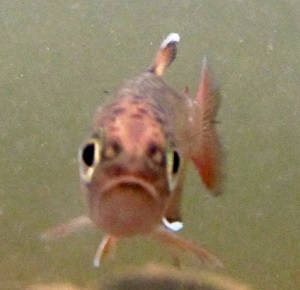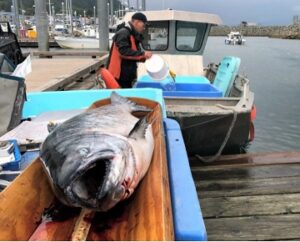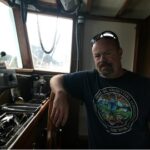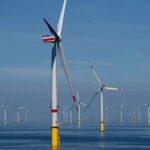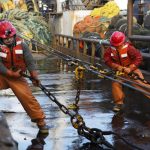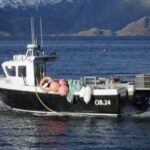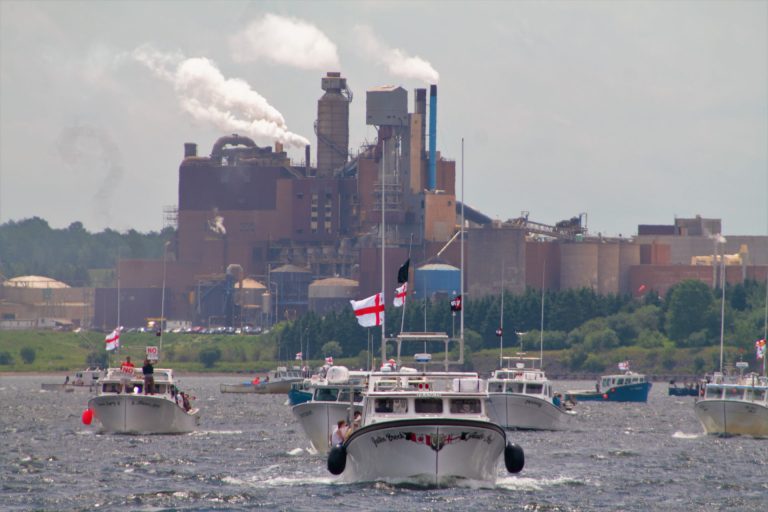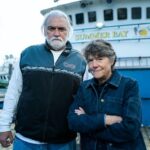Tag Archives: British Columbia
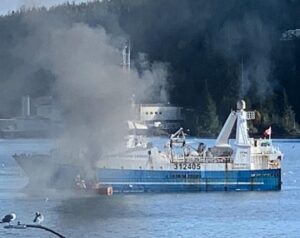
Canadian Coast Guard knocks down Hardy Bay boat fire
The Canadian Coast Guard stopped a blaze from ravaging a small fishing boat in Hardy Bay. According to Brian Salisbury with Marine Search and Rescue, the call came in at 12:30 pm yesterday (Thursday), with Coast Guard crews able to knock the fire down and rescue passengers. Reports point to the small boat belonging to a bigger boat called The Blue Dragger, and in a Facebook post, Port Hardy Fire Rescue said the flames were “highly visible.” >click to read< 09:37
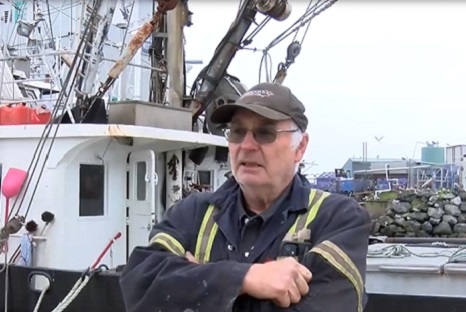
Island fishermen ‘worried’ as cons call to stop herring fishery set to start in days
Lasqueti Island herring fisherman Billy Forbes worries about the future of his four-generation long fishing family. After 51 years of captaining fishing boats in the Strait of Georgia, Forbes said he’s unsure if handing over the family’s namesake boat would be a gift to his grandson or a curse. “This is all he knows, so if there’s nothing left for him he’s gotta find something else,” said Forbes. Taylor Forbes, 23, said he has started to lose hope there’s a future in fishing. Video, >click to read< 08:21
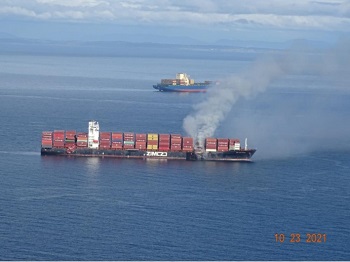
U.S., Canadian Coast Guards respond to container vessel near the Strait of Juan de Fuca
The U.S. Coast Guard and Canadian Coast Guard responded to a container vessel that lost 40 containers during heavy weather Friday 40 miles from the Strait of Juan de Fuca. U.S. Coast Guard Sector Puget Sound received notification from Prince Rupert Marine Communication and Traffic Services at 12:49 a.m. Friday that the shipping vessel Zim Kingston reported losing approximately 40 containers overboard when the vessel heeled 35 degrees in heavy swells 38 miles west of the Strait of Juan de Fuca. The lost containers were initially reported to be general containers with no dangerous cargo. >click to read< 11:15
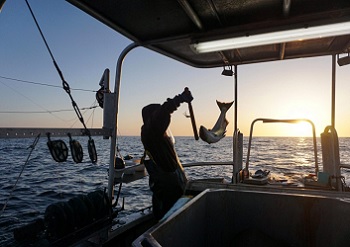
Fishery Closures and the Ghosts of Past Mistakes
The news spread quickly across the calm June waters off the west coast of Vancouver Island, British Columbia, as fishers jumped on the radio to figure out what had just happened. The radio chatter was incessant as fishers wondered aloud where they’d be allowed to fish, if they would be out of business, and what the future would hold. “Everyone was freaking out because all of those questions were unanswered,” Christian says, adding this policy will likely end British Columbia’s commercial salmon industry.,, Under the PSSI, DFO plans to close 57 percent of the 138 Pacific salmon fisheries along the west coast of British Columbia and Yukon. >click to read< 10:06
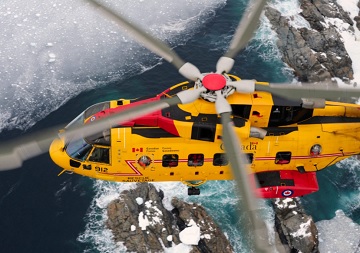
RCAF marks 20th anniversary of the Cormorant
On the Oct. 11, 2021, the Royal Canadian Air Force’s CH-149 Cormorant fleet of AW101 helicopters celebrated 20 years since the aircraft’s initial delivery to Comox, British Columbia. This significant milestone compliments the fleet’s recent achievement of 100,000 flight hours. Since delivery of the CH-149 Cormorant helicopters, the Royal Canadian Air Force has been performing thousands of life saving missions throughout Canada, from the peaks of snowy windswept mountains, the east and west maritime coasts, to the high Arctic as well as internationally – providing humanitarian support. >click to read< 11:59
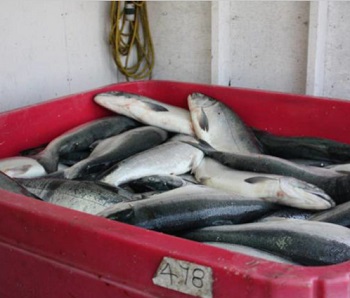
Commercial harvesters “financially devastated” – 79 B.C. commercial salmon fisheries closed for the 2021 season
The abrupt closure of nearly 60 per cent of B.C. salmon fisheries this summer has left commercial harvesters “financially devastated,” according to a survey by the United Fishermen & Allied Workers’ Union. The survey, which was open to both members and non-members of UFAWU-Unifor, found the unexpected loss of income to have been the biggest blow to harvesters following the effects of the pandemic on the industry.,, For a lot of commercial harvesters, the retirement plan is their boats, gear and licence. In ideal circumstances, if you are a licence-holder, you can sell your licence with your boat when you are ready for retirement,,, >click to read< 15:16
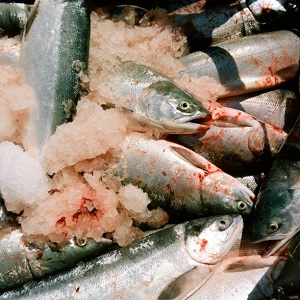
One Alaska Bay Is Booming With Salmon, For Now
Bristol Bay’s sockeye harvest has long made up about half of the global catch of this species, in a seasonal blitz as short as it is enormous: The fishery lasts a mere six weeks. Each summer, 15,000 seafood processors, boat-based fishermen, and setnetters, including families such as the Bandles, gather here to support an industry worth more than $2 billion in 2019. Some fishermen will net enough cash to live on until the fish come back the next year. And this year, Bristol Bay outdid itself,,, But such riches are localized. Outside of Bristol Bay, salmon fisheries are failing, including those on British Columbia’s famed Fraser River, on Alaska’s Chignik and Copper Rivers, and in Cook Inlet. Five hundred miles north of Bristol Bay, Yukon River salmon runs have totally collapsed. >click to read< 12:35 ADFG: Bristol Bay sockeye runs set all-time record – It’s official: Bristol Bay’s 2021 commercial salmon season was the largest on record. >click to read<
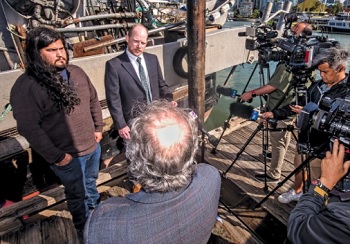
“The industry needs immediate relief,” – B.C. fishermen say Ottawa has cast them adrift
The flotilla of commercial fishing boats was to converge on False Creek harbour to try to raise public awareness about their plight, but winds prevented most boats from getting there. Those who did make it to False Creek said their livelihoods have been threatened by a fiat issued by federal Fisheries and Oceans Minister Bernadette Jordan that closed about 60% of the fishery to commercial fishermen. “At the swipe of a pen, the minister took all these fisheries off the table and eliminated the income for all these fishermen,” said Andy Olson, executive director of the Native Fishing Association. “It was clearly politically motivated. >click to read< 10:48
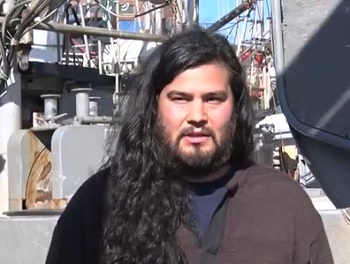
B.C. fish harvesters protest salmon fisheries closures
The Canadian Independent Fish Harvesters’ Association addressed the media near Vancouver’s Granville Island on Sep. 15. The organization is upset over DFO’s salmon closures at the end of June. According to Bernadette Jordan, the move was made as “an initial step towards longer term reductions in fishing pressure on stocks of conservation concern.” DFO’s Salmon Integrated Fisheries Management Plan will likely reduce B.C.’s commercial harvest by 60 per cent this year. Commercial fisher James Lawson says “I started behind almost $70,000 and at the last second I found out I’m not going to be able to fish; so that’s not a great position to be in and there’s no light at the end of the tunnel.” Video, >click to read< 19:14
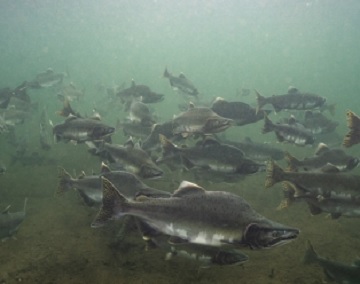
Here’s what fish look like under the Squamish River and its tributaries
For several years, Fernando Lessa has been dipping his camera into the Squamish River and its tributaries to capture fish. The professional photographer creates stunning underwater images of salmon that make viewers feel like they are swimming alongside the fish. He began capturing these pictures in the Squamish Valley in 2017. He will walk the length of the river looking for unique images to jump in front of his lens,,, 14 photos, >click to read< 10:34
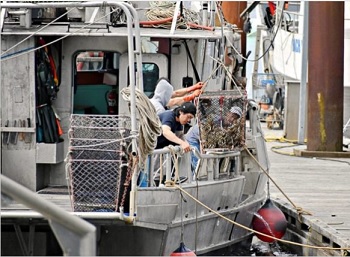
Appeal and application process frustrates – Fish Harvester Benefit and Grant Program extended
The appeal deadline for the Fish Harvester Benefit and Grant Program has been extended by DFO to Oct.1 from Sept.15 following months of delays and online application issues. The appeal process has been plagued by an “online application nightmare” and a “communication cluster,” Problems included multiple vague error messages prompting harvesters to call Service Canada for help. The error messages numbered seven, 10 and 12, offered no definition. This left many harvesters clueless,,, >click to read< 14:20
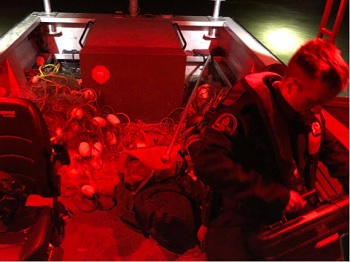
Illegal fishing nets seized on Fraser River by DFO
Fishery officer Mike Fraser, DFO detachment commander for Fraser East, Conservation and Protection (C&P), said right now there are 16 active investigations underway into illegal fishing. About 160 of the seized illegal gillnets came from the Lower Fraser, from the mouth of the river, to just past Yale. “We’ve been getting eight to 10 nets a week,” Despite what they described as “high compliance,” from area First Nations, DFO said it has received “an increase in public reports” of illegal fishing in a few areas, as well as illegal fish sales. “As a result, we are increasing our enforcement activities, particularly at night.” >click to read< 13:32

Fish Harvesters Benefit Program open for 2nd phase
Fish harvesters in the Northcoast and Haida Gwaii can now apply for the second phase of benefit payments under the Fish Harvester Benefit and Grant program, the Ministry of Fisheries and Oceans announced, on Aug. 5. This program helps eligible self-employed fish harvesters, who were not eligible for other financial relief programs, access critical support in dealing with the financial burdens of COVID-19. More than 18,000 fishers and families have accessed $130 million through the program in all provinces across Canada since its May 2020 inception. This includes self-employed commercial and freshwater fish harvesters, Indigenous harvesters with communal commercial fishing licences designated by their communities, and sharepersons crew who had less than their usual income in 2020. >click to read< 07:53
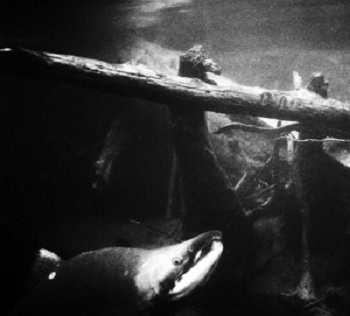
A virus that flourishes in fish farms is now threatening wild populations.
Wild salmon in British Columbia are in trouble. According to one estimate, some populations have dropped by as much as 93 percent since the early 1990s. Lately, the situation has grown dire.,, Last year, the number of sockeye returning to spawn in the Fraser River crashed to a record low. It’s hard to say exactly why this is happening, though logging, climate change, and overfishing all seem to play a role. Among the most controversial potential factors, however, is the virus Piscine orthoreovirus, or PRV. The virus isn’t necessarily fatal, but infected fish may be weakened and unable to swim as fast, making them more likely to be eaten by predators or fail to migrate upriver in order to spawn,,, Not everyone agrees. Among the dissenters is Fisheries and Oceans Canada-DFO,,, >click to read< Killing Sea Lions to Save the Salmon, February 1,1925, Dorothy G. Bell, >click to read< 19:39
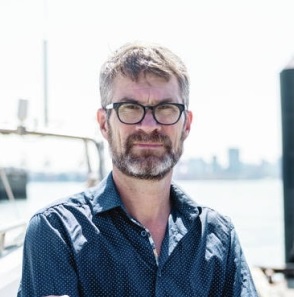
British Columbia: Pollution expert aims to create ‘water champions’
Peter Ross, an internationally recognized expert in water pollution, looks out over the sparkling waters of Burrard Inlet and sees something others do not. Invisible chemicals tend to be out of sight and out of mind, says Ross. But they leach into watercourses and into the marine food chain, creating “an invisible crisis.” “There are 500,000 chemicals on the global marketplace,” he said. Many of those will surreptitiously make their way into the food chain. Salmon heading up the Fraser River are also “basically running a gauntlet,” said Ross, “past wastewater treatment plants, past farms, past pulp mills, past refineries and storm drains.” Pollution is also an issue in drinking water,>click to read< – A global problem? 6PPD quinone: The environmental contaminant killing Coho salmon-An everyday chemical has been found to be highly toxic. Contamination of waterways is responsible for what had been the unexplained mass deaths of Coho salmon. We take a look at 6-PPD quinone, >click to read<14:39
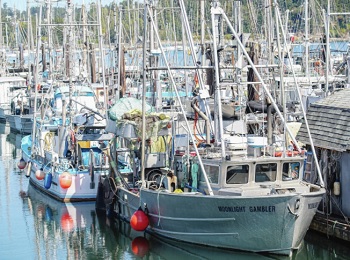
Commercial salmon fishers reeling from sweeping closures
Fourth-generation fisherman Jordan Belveal of Nanaimo was ready to head north on his boat Blue Bayou to catch coho July 1 in Dixon Entrance, between B.C. and Alaska, when he heard about the widespread closures. Although he says he doesn’t mind keeping his boat tied to the dock if it means preserving some runs, Belveal opposed the closures, saying some fisheries with a good abundance of salmon have been cancelled. Losing the 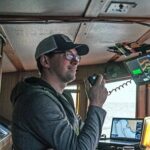 coho fishery has had a “major effect on us,” said Belveal, who operates Island Wild Seafoods with wife Catlin, selling hook-and-line caught sustainable wild seafood to Vancouver Island customers. Belveal is now counting on the Aug. 12 chinook fishery off Haida Gwaii, which would normally have opened in June but was delayed to allow fish to head to their home rivers on Vancouver Island and to the Fraser River, >click to read< 09:56
coho fishery has had a “major effect on us,” said Belveal, who operates Island Wild Seafoods with wife Catlin, selling hook-and-line caught sustainable wild seafood to Vancouver Island customers. Belveal is now counting on the Aug. 12 chinook fishery off Haida Gwaii, which would normally have opened in June but was delayed to allow fish to head to their home rivers on Vancouver Island and to the Fraser River, >click to read< 09:56
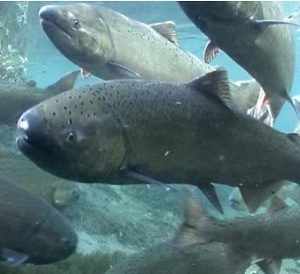
Could B.C. commercial salmon fishery closures affect Southeast Alaska?
Department of Fisheries and Oceans Canada, the federal agency that manages Canada’s fisheries, effectively ended the 2021 commercial salmon season on the West Coast in late June. Canada’s fishing industry was stunned, says B.C. Seafood Alliance Executive Director Christina Burridge. “First Nations have harvested salmon forever. And post-contact, salmon canneries are what in the sense built this province. To be now in this situation seems really tragic to me.” The closure came just weeks after Canada announced a more than half-a-billion dollar plan to revitalize its flagging Pacific salmon stocks in B.C. and Yukon Territory.,, The Chinook on the transboundary rivers Unuk and Chilkat are among the current Southeast stocks of concern. >click to read< 10:11
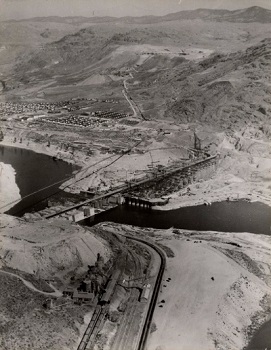
Flawed rescue? – Franklin D. Roosevelt asked for plans for a low dam. Joe Biden wants windmills
“The federal role in damming the Columbia tied in well with the New Deal belief that the government should stimulate economic recovery by putting people to work and encouraging the creation of public utilities,” records a National Park Service history of the river’s Grand Coulee dam. “Franklin D. Roosevelt, elected president of the United States in 1932, asked for plans for a low dam with foundations strong enough to support a higher dam later, one that would back water up to the Canadian border.” (President Joe Biden’s efforts to grow offshore wind) No thought was given to the river’s salmon. “Of all the impacts that caused extinctions of 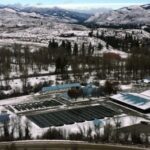 Columbia River Basin salmon and steelhead, dams were the most significant. “The dam wiped out runs that spawned in tributaries that drained into the Columbia from that point, river mile 596, to the headwaters, a distance of 645 river miles. Adding the tributary miles where salmon spawned nearly doubled the distance. >click to read< 14:36
Columbia River Basin salmon and steelhead, dams were the most significant. “The dam wiped out runs that spawned in tributaries that drained into the Columbia from that point, river mile 596, to the headwaters, a distance of 645 river miles. Adding the tributary miles where salmon spawned nearly doubled the distance. >click to read< 14:36
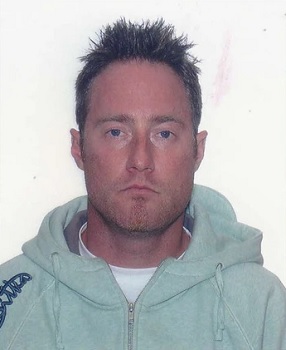
Province wants cash, house from banned commercial fisherman
The B.C. government is asking to seize a Gabriola Island home and more than $1.3 million in cash from a commercial fisherman who is banned from fishing until 2038. In a petition filed on June 28 in B.C. Supreme Court, the B.C. Civil Forfeiture Office says the cash and the home are proceeds of illegal fishing and money laundering. Named in the civil lawsuit are the commercial fisherman Scott Stanley Matthew Steer, and his spouse, Melissa Dawn Larocque, also known as Melissa Steer. Also named are Melissa’s mother, Diane Gail Butz, and several companies.,, The lawsuit alleges Steer, Larocque and the companies “continue to engage in commercial fishing, possession of fishing gear, and the illegal capture and sale of fish.” >click to read< 15:05
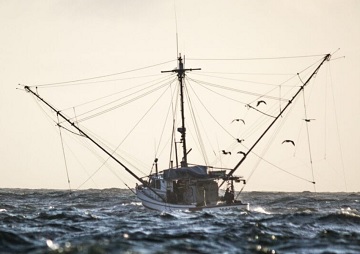
DFO’s sweeping salmon fishery closures leave workers reeling – Commercial fishers are paying the price,,,
“When we got that news, we’re like, shit, what do we do? And then there’s a little glimmer of hope, they didn’t say Area 4 was going to be closed for sure. That’s where I’m sitting now.” Carpenter, who is 54 years old, said waiting for the federal Fisheries and Oceans Department’s next move is a “huge gamble.” He said he has things he can do to earn money and fill his freezer if he can’t go out and fish but he’s worried about some of the older fishers who don’t have the same options. “What are they supposed to do? They’re going to go home, they may drink themselves to death or they may lose their marriages, their houses, sell everything. Who knows?” >click to read< 17:57
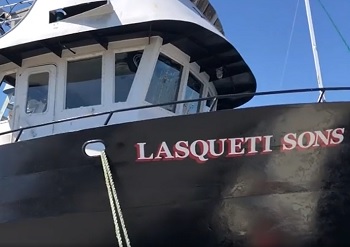
Vancouver Island fishermen upset after sudden salmon fishing closures
Bill Forbes and his crew geared up in French Creek to go salmon fishing. Forbes and his crew, who are heading to a spot near Prince Rupert, are one of the few commercial fisheries still open following a sudden and massive closure by the Department of Fisheries and Oceans on June 29. “They can’t keep blaming the commercial fishermen, we may be part of the problem but kicking us out is not the solution,” said fisherman Bill Forbes. “It throws this boat and all my crew, I’ve got three generations of Forbes’ on this boat and it just puts us out of work. I’m old but you know my grandson and my nephew are not. So they have to go someplace else and I don’t know where that someplace else is,” Video, >click to read< 08:54
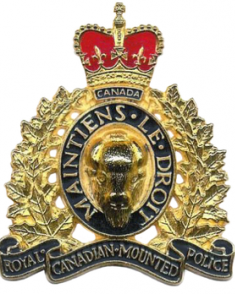
RCMP check of U.S. fishing vessel in B.C. led to multiple weapon seizures and a U.S. warrant arrest.
The crew of an RCMP Shiprider vessel, boats that have been enforcing the Quarantine Act and Customs Act since the pandemic began, came across a 54-foot fishing vessel about two nautical miles from the border near Moresby Island on June 23, according to police. The captain and three occupants told police they were travelling from Seattle to Alaska to fish. Police directed the boat and crew to Bedwell Harbour for inspection from the Canadian Border Services Agency where undeclared prohibited firearms and parts along with unrestricted firearms were found. During the inspection, officers found one of the individuals was found to have a U.S. felony warrant for drug-related charges. >click to read< 13:17
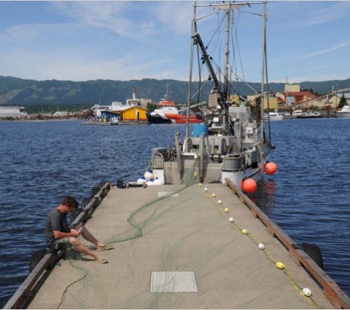
British Columbia: Fishermen left high and dry over sudden DFO closures, financial relief needed.
Gord Johns, NDP MP for Courtenay-Alberni, is calling on the federal Minister of Fisheries and Oceans to provide immediate relief to salmon harvesters following the sudden announcement by her department to close 60 percent of commercial salmon fisheries on the west coast of British Columbia. “This decision has blindsided fish harvesters, many of whom have already heavily invested in fishing equipment and supplies for the season and now face financial hardship,” Johns wrote in a letter to the minister, Bernadette Jordan. >click to read< 09:10

DFO Fishery Closures – ‘radical course of action’ will devastate salmon harvesters and coastal communities
A coalition of 13 members partnered in the media statement issued by UFAWU, decried the Department of Oceans and Fisheries (DFO) announcement of closures as “a radical course of action to combat the salmon crisis,”. “Many harvesters were freshly geared up, fees paid and deckhands aboard, heading their vessels to the salmon openings they were told to expect,,, “These closures will devastate salmon, harvesters, and coastal communities alike. The only gain will be the political favour of those who’ve been fooled into thinking this is the answer to the salmon crisis,” UFAWU stated >click to read< 14:29
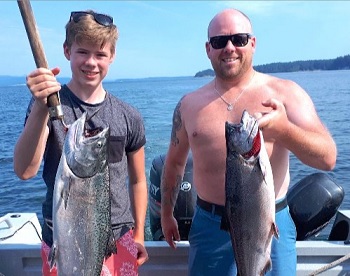
Should DFO rein in sport fishing to help save salmon?
Conservation groups want Ottawa to dramatically curtail the recreational fishery as it did with the commercial fishery last week in order to save wild salmon on the West Coast. But the sport sector, equally keen to protect the prized but diminishing chinook salmon, wants Fisheries and Oceans Canada (DFO) to make sure any further measures and restrictions this year are backed by science, and provide stability and results for the embattled fishers and the fish population. The federal government failed to address the recreational fishery, which also impacts salmon returns, despite making historic and dramatic reductions to the commercial fleet on the West Coast, said Jeffery Young, science and policy analyst with the David Suzuki Foundation. >click to read< 08:47
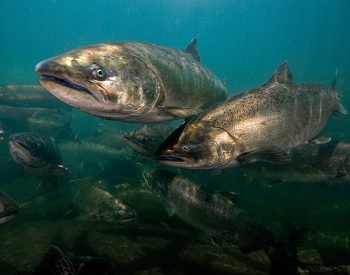
Survivor: Salmon Edition
In 2020, COSEWIC designated seven chinook populations in southern British Columbia as either endangered or threatened. Much the same is true in the Columbia River watershed in the northwestern United States, where chinook populations may have lost more than one-third of their genetic diversity. More worrying still, the rate of young salmon returning as adults to rivers from California to Alaska over the past half-century has plummeted to one-third of earlier levels. It’s a picture that puzzles many researchers. A myriad of variables impact salmon survival and it takes time and research to untangle them. Land use, from mining to damming and irrigation, for example, has affected chinook stocks in the Pacific Northwest at critical life stages, but it can’t be blamed for what’s happening in the northern latitudes. >click to read< 09:05
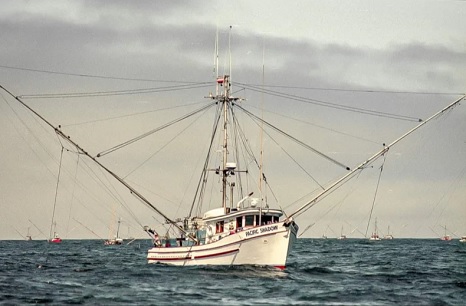
On the Brink of Extinction: DFO salmon closures sink dreams of Pacific fishermen
Geoff Millar’s livelihood is on the brink of extinction after DFO closed roughly 60 per cent of B.C.’s commercial salmon fisheries. The closures, DFO stated, will last “multiple generations” of fish to save tumbling salmon populations. The decision leaves Millar, along with hundreds of other commercial fish harvesters on the B.C. coast, in despair and in difficult financial straits. “These closures have absolutely devastated us,” affirmed James Lawson, a Heiltsuk fish harvester based in Campbell River, B.C.,, “We’ve been forced into a corner, and the only option is retirement, that seems to be DFO’s goal.” >click to read< 07:35
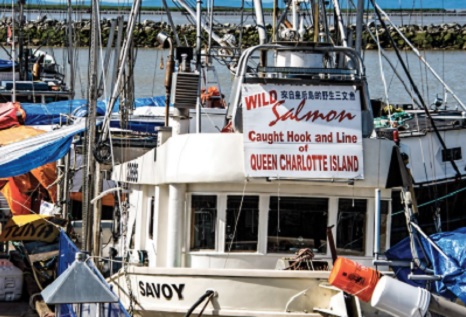
Significant Commercial Fisheries closures in BC – DFO to offer licence buyback to those ready to call it quits.
Federal Fisheries Minister Bernadette Jordan today announced “an initial step towards longer-term reductions in fishing pressure on stocks of conservation concern with significant commercial salmon closures for the 2021 season.” Jordan also announced there will be a federal fishing licence buyback offered to commercial fishers who are ready to call it quits. DFO’s Salmon Integrated Fisheries Management Plan for 2021-22 will result in closures to about 60% of commercial salmon fisheries in B.C. for 2021. >click to read< 15:22






